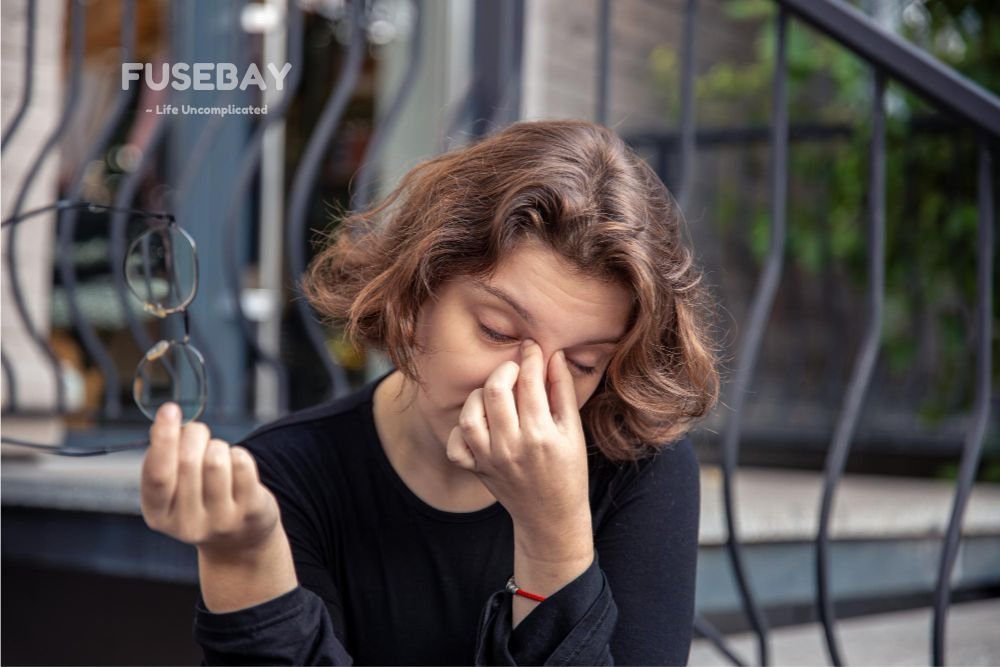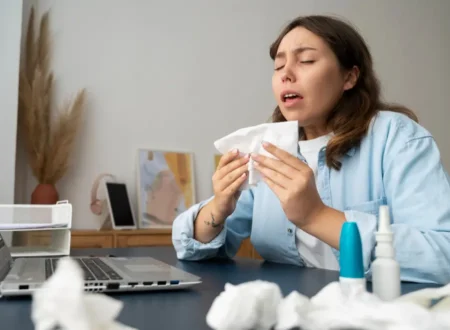How to Treat Itchy Eyes from Allergies:
Allergies can turn your day upside down—and itchy eyes are one of the most irritating symptoms. Itchy eyes can be incredibly frustrating, especially when they strike during allergy season. If you’re wondering how to treat itchy eyes from allergies, you’re not alone—millions suffer from the same discomfort every year. At Fusebay, we’re committed to providing clear, practical health tips to help you manage everyday struggles, including allergy-related eye irritation. Whether it’s dust, pollen, or pet dander causing the problem, understanding the right treatment methods can bring quick relief and long-term comfort.
Let’s explore the causes behind itchy eyes, understand the science of allergic reactions, and discover the best ways to manage and prevent this common yet overlooked condition.
Understanding Allergic Conjunctivitis
Itchy eyes from allergies are caused by allergic conjunctivitis—a reaction where allergens trigger inflammation in the thin membrane covering your eyes.
- What Happens to Your Eyes?
Allergens such as pollen, pet dander, or dust mites enter the eyes and cause the immune system to overreact, leading to redness, tearing, and intense itching. - Is It Dangerous?
While usually not harmful long-term, persistent irritation can affect vision and daily activities if left untreated. - When Is It Most Common?
Symptoms are often worse during allergy seasons (spring and fall) but can occur year-round due to indoor allergens.
“The eyes are not only the window to the soul—they’re the first to react to the world around us.” – Unknown

When to See a Doctor?
Allergy symptoms are usually manageable, but certain signs mean it’s time to see an eye care professional.
- Persistent Redness and Swelling
If symptoms last more than a week despite treatment, seek help. - Blurry Vision or Light Sensitivity
These may indicate a more serious issue like an eye infection. - Mucus Discharge
Allergies usually cause watery eyes, not thick discharge. This might point to a bacterial infection.
Common Triggers Behind Itchy Eyes
Understanding what is causing the reaction is essential prior to treatment. The first step is to pinpoint the source of your allergy.
1. Seasonal Allergens
- Pollen from Trees, Grass, and Weeds
Common during spring and fall, airborne pollen is a major trigger of eye allergies. - Mold Spores
Mold grows in damp places and releases spores into the air, especially during wet seasons. - Wind and Dry Air
Dry, dusty conditions can make pollen more aggressive and irritating to sensitive eyes.
2. Indoor Allergens
- Dust Mites
Found in bedding, carpets, and upholstery, dust mites are a year-round issue. - Pet Dander
Proteins in the skin and saliva of pets like cats and dogs can cause strong allergic reactions. - Household Products
Cleaners, air fresheners, and sprays can irritate sensitive eyes and mimic allergy symptoms.
“Allergies are the body’s overreaction to a harmless world.” – Dr. Miriam Andrade

How to Treat Eyes from Allergies?
Now let’s get to what you’re here for—how to soothe, treat, and prevent itchy eyes effectively.
1. Use Antihistamine Eye Drops
- Fast Relief from Itching
These drops block histamines (the chemical your body releases during allergic reactions), offering quick and lasting relief. - Available Over-the-Counter
Most pharmacies stock them, and they’re safe for short-term use unless otherwise advised. - Consult Your Eye Doctor
If symptoms persist beyond a few days, your doctor may prescribe stronger eye drops or anti-inflammatory solutions.
2. Apply a Cold Compress
- Instant Soothing Effect
A clean, cold cloth placed over closed eyes can reduce swelling and calm itching almost instantly. - Do It Twice a Day
Morning and evening compresses help reduce symptoms without medication. - Avoid Rubbing
Rubbing inflamed eyes makes it worse. Let the compress work its magic instead.
3. Keep Your Environment Allergen-Free
- Use Air Purifiers
99% of allergens in indoor air can be removed by HEPA filters, reducing exposure and irritation. - Wash Bedding Frequently
To get rid of dust mites, use hot water and, if at all possible, dry in the sun. - Groom Pets Regularly
Keep them clean and off your furniture to reduce dander buildup.
4. Wear Protective Eyewear Outdoors
- Block Pollen and Dust
Sunglasses or wrap-around glasses can act as a barrier, keeping allergens out of your eyes when you go outside. - Avoid Windy Days
Stay indoors or wear sunglasses to protect your eyes when pollen levels are high. - Limit Contact Lens Use
Allergens can stick to contacts, worsening irritation. Try wearing glasses during allergy seasons.
5. Consider Oral Antihistamines
- Whole-Body Relief
Pills like cetirizine or loratadine help control overall allergic symptoms, including itchy eyes. - Non-Drowsy Formulas Available
These can be taken daily during high-risk months without affecting your energy levels. - Always Read the Label
Never mix medications without checking interactions, especially if you’re using both drops and tablets.

Natural Remedies to Try at Home
Some people prefer natural alternatives. While not replacements for medical treatments, they can offer additional relief.
1. Cucumber Slices
- Anti-inflammatory and Cooling
Cucumber naturally reduces puffiness and cools irritated eyes. - Use Chilled for Better Effect
Keep them in the fridge and apply for 10 minutes at a time.
2. Chamomile Tea Bags
- Calming Herbal Properties
Steep two chamomile tea bags, let them cool, then place over closed eyes. - Use Caution
Always test for skin sensitivity before applying anything to the eyes.
3. Aloe Vera Gel (Around the Eyes)
- Skin-Soothing Properties
Aloe can calm skin inflammation around itchy eyes. - Never Apply Directly Into the Eyes
Only use around the eye area after testing for irritation.

Preventive Measures to Avoid Future Reactions
They say prevention is better than cure—and that’s especially true with allergies.
1. Monitor Pollen Counts Daily
- Use Weather Apps or Allergy Alerts
When pollen levels are high, especially in the morning, don’t go outside.
2. Change Clothes and Shower After Being Outdoors
- Remove Pollen from Your Body
This prevents allergens from lingering on your skin or hair and causing eye irritation later.
3. Don’t Forget the Car Interior
- Keep Windows Up During Allergy Season
Use car air purifiers and regularly clean the AC system.
“An ounce of prevention is worth a pound of cure.” – Benjamin Franklin

Conclusion:
Itchy eyes from allergies may seem like a small issue, but anyone who has experienced it knows how much it can affect focus, productivity, and peace of mind. From over-the-counter drops to natural remedies and lifestyle adjustments, there are plenty of solutions to help manage your symptoms and reclaim comfort. The key is to stay ahead of your triggers and treat your eyes gently and consistently.
At Fusebay, we believe health is wealth—and your eyes deserve just as much attention as any part of your wellness routine. Now that you know how to treat itchy eyes from allergies, it’s time to take action, see clearly, and live fully—without the itch.
Read More: Common Eyes Problem with Age
Frequently Asked Questions:
1. What causes itchy eyes, and how to Treat Itchy Eyes from Allergies?
Itchy eyes are caused by an allergic reaction when substances like pollen, dust, pet dander, or mold come into contact with the eyes. The immune system treats these harmless particles as threats, releasing histamines that cause inflammation, redness, and itching.
2. Are antihistamine eye drops safe for regular use?
Yes, antihistamine eye drops are safe for short-term use and can provide fast relief from allergy symptoms. However, using them for long periods without guidance may lead to dryness or irritation. It’s always wise to follow dosage instructions or consult an eye care specialist.
3. Can home remedies help relieve itchy eyes from allergies?
Yes, home remedies like cold compresses, cucumber slices, and chamomile tea bags can soothe itchy eyes naturally. These methods reduce inflammation and offer temporary comfort. However, they should be used alongside medical treatment for more consistent results.
4. Should I stop wearing contact lenses during allergy season?
Wearing contact lenses during allergy season can make symptoms worse, as allergens can stick to the lenses. Switching to glasses can reduce irritation and provide a barrier against airborne allergens. It’s a simple way to give your eyes a break.
5. When should I see a doctor for itchy eyes?
You should see a doctor if your symptoms last more than a week or if they include blurry vision, sensitivity to light, or discharge. These signs may indicate something more serious than allergies, like an infection, and require professional evaluation.







